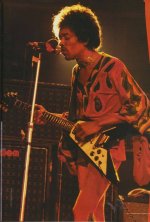Classic case of a mismanaged business that was headed up by a CEO who lost his way and began empire building in non-core areas (consumer electronics!) levering up the firm while doing so. Beyond all that, the CEO, Henry Juszkiewicz, was a micro-manager and complete odd ball, alienating employees and key retail relationships alike. The ironic thing is that he was part of a consortium of buyers in the mid-1980s of Gibson when it was in a similar bad way financially (which is why he owned 37% of the company prior to the Chapter 11) and he actually turned it around and reverted attention on building quality guitars, invested in making the Epiphone entry-level brand more consistent, quality wise, etc...in the past 5- to 10-years he went on this buying binge of life-style consumer electronic assets and in the meantime took his eye off the core business. Quality at Gibson has become more erratic, the kiss of death for a premium brand that was predicated on delivering high quality instruments to its customers!
In a Chapter 11 reorg, the creditors (which in this case are distressed debt hedge fund investors, including a subsidiary of KKR which is a large PE shop) come in and take ownership of the equity (so the existing equity holders including Juskiewicz get wiped out) and they have extended $135 in DIP (debtor in possession) financing to allow the company to continue to operate during the reorg. The core brands that will stay with Gibson are Gibson and Epiphone guitars, as well as KRK pro audio gear and Cerwin Vega (pro and consumer audio). All the other brands will be auctioned off to raise capital to help with refinancing the existing $500 mill debt that is in default as well as the new $135 mill DIP financing, along with restructuring (taking out operating costs at Gibson). Right now Juskiewicz has a one-year deal to stay on as CEO/advisor through the transition until the creditors/new owners find a replacement for him that they can operationally turn around the core guitar business.
I forget whether it was the S&P or Moody’s Credit Analyst that Said in his report the core Gibson guitar business (which is a $1bn+ revenue business) is reasonably healthy and could be quite a profitable business if managed well and if it did not have to pay the interest expense associated with the debt raised to finance a lot of these non-core acquisitions. Also the creditors, do not want to put any incremental investment dollars in the re-orged Gibson until Juskiewicz is no longer there and his replacement is in full control.
Classic case of an iconic brand run into the ground by incompetence. Now it’s up to new owners and management to revive this tarnished iconic american brand, and if they do it right, they will earn a nice return on their investment.

